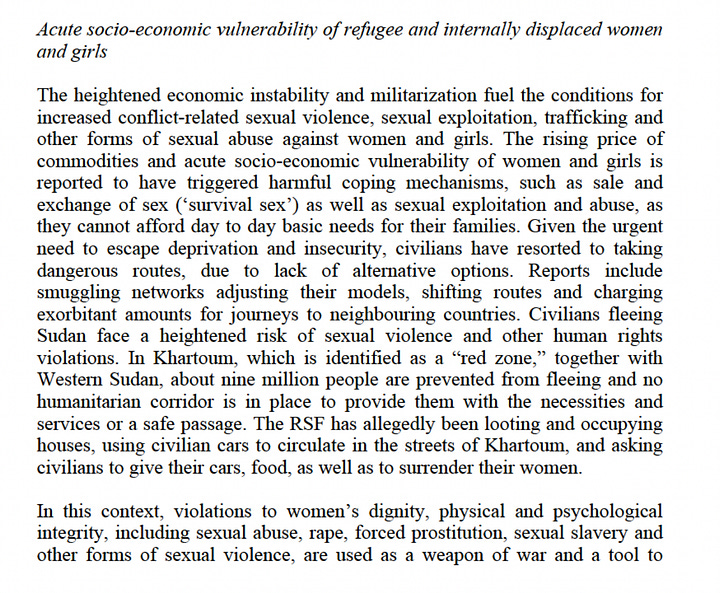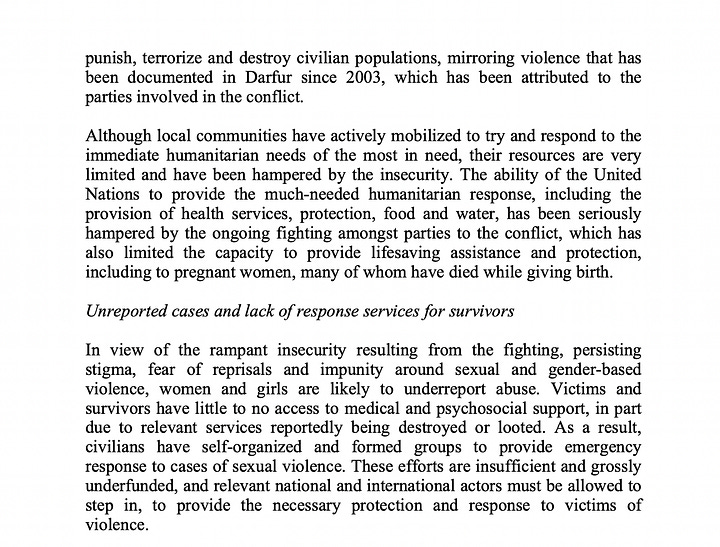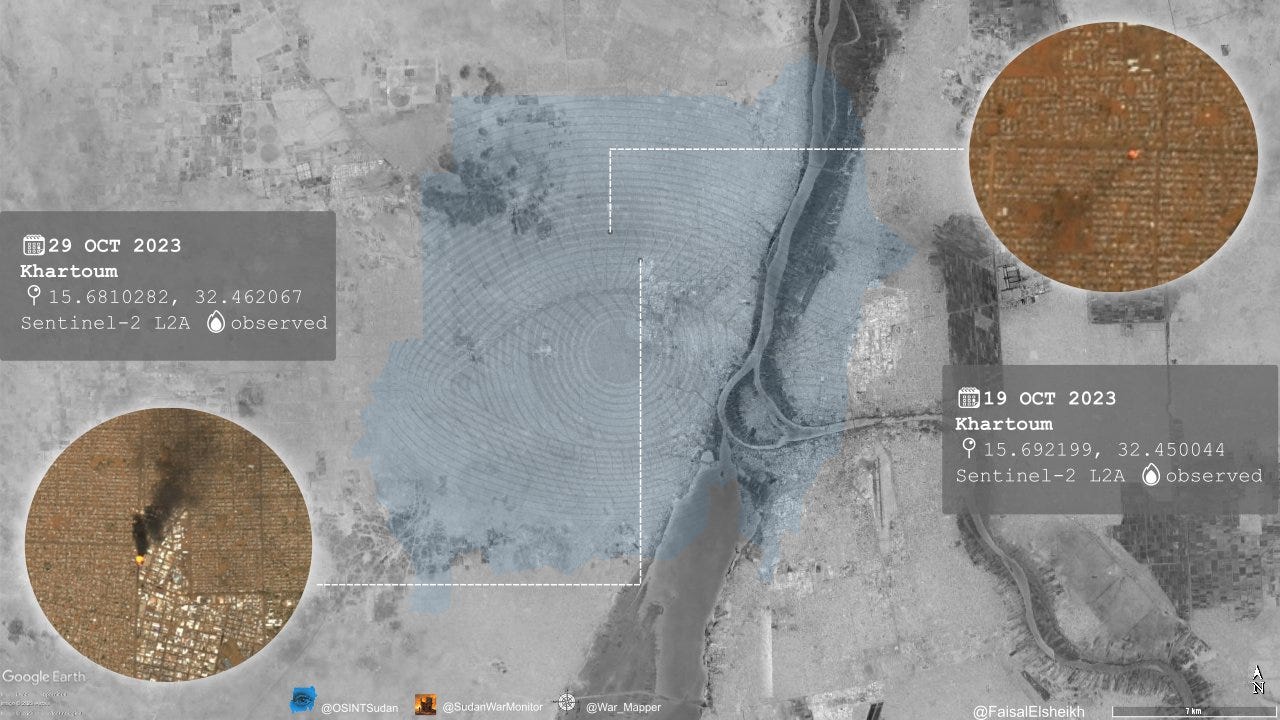Minority women "abducted and held in degrading, slave-like conditions"
Slavery allegedly reemerging in RSF-controlled territory

The United Nations Human Rights Office said Friday, “We are deeply alarmed by reports that women and girls are being abducted and held in inhuman, degrading slave-like conditions in areas controlled by the Rapid Support Forces (RSF) in Darfur, where they are allegedly forcibly married and held for ransom.”
“Credible information from survivors, witnesses and other sources suggests more than 20 women and girls have been taken, but the number could be higher,” said the Geneva-based UN rights organization, known by its acronym OHCHR. “Some sources have reported seeing women and girls in chains on pick-up trucks and in cars.”
OHCHR said it initially received reports of this practice in Khartoum, but more recently “an increasing number of cases (are) being reported in the Darfur region, particularly North, Central and South Darfur, and in the Kordofan region.
Reem Alsalem, UN Special Rapporteur on Violence Against Women and Girls, included additional details in a letter she wrote in August to the RSF commander Mohamed Hamdan Dagalo, co-authored by more than a dozen other UN rapporteurs. They reported “credible allegations of widespread and systematic sexual violence, harassment and abuse, as well as acts tantamount to enforced disappearance, by the RSF against minority communities, women and girls in conflict-affected areas, particularly against refugees and internally displaced persons.”
“Credible allegations of widespread and systematic sexual violence… by the RSF against minority communities, women, and girls in conflict-affected areas, particularly against refugees and internally displaced persons.”
“In the vast majority of documented cases, victims and survivors identified individuals wearing RSF uniforms as the perpetrators… Cases of sexual assault against girls under the age of 12 were also reported. There are reports that such incidences of conflict-related sexual violence are ethnically motivated, and, in some cases, perpetrators have directed racial slurs at victims,” the letter stated.
Abducted women were held in “secret houses in Khartoum where they were held in inhuman or degrading conditions, threatened, forced to perform labour and sexual services to RSF members, and were vulnerable to sexual assault and sexual slavery.”
The letter added:
“Members of the RSF also allegedly kidnapped women and girls and held them hostage in parts of Darfur, to be ransomed back to their families who were requested to pay large sums of money to secure their release.”
“In another case, women and girls were reportedly abducted by RSF members in West Darfur and held for several days in conditions amounting to sexual slavery.”
“Trucks and cars identified as belonging to the RSF militias were also seen on the roads to [censored] carrying women and girls in handcuffs and shackles.”
The letter noted that not all of these allegations were verifiable, saying, “While we do not wish to prejudge the accuracy of these allegations, we are deeply concerned by the reported ongoing repression and serious human rights abuses…”




‘Sold as slaves’
These UN reports echo reports by Sudanese human rights organizations, including SIHA, the Strategic Initiative for Women in the Horn of Africa.
SIHA stated in a report October 25:
In many cases, women abducted by the RSF are kept in conditions that amount to slavery, expected to perform domestic labour for RSF soldiers and have sex against their will without the ability to leave. This has occurred in both Khartoum and Darfur. In a recent video shared by Sudanese activists, a woman states that women are girls are subjected to human rights violations in Um Al Qura and Shakwai in al-Geneina in West Darfur, including sexual violence, torture and are being offered for sale by RSF members to other RSF members.
SIHA received reports from eyewitnesses in Serf Umra and Kerdeig in North Darfur who observed girls bound and held in RSF vehicles.
At times, these women are not only taken into slavery but also sold as slaves. This has been reported multiple times, with most cases of women being sold taking place in Darfur. One eyewitness recounted an incident where women were bound and being held by the RSF and offered for sale in North Darfur. Another reported that he saw women bound in pick-up trucks in North Darfur. He said that it is known that these women are being sold in public spaces in al-Fashir for 200,000 Sudanese Pounds. He mentioned that one of the locations where this occurs is a specific area near the Al-Mina Al-Bari bus station.
SIHA also reported that financially vulnerable women are being taken advantage of by RSF forces and forced to exchange sex for basic needs.
There have also been forced marriages as a means of legitimizing rape and sexual slavery. “Three cases of forced marriage were reported to SIHA from Northern Khartoum in July. An eyewitness reported that a photographer was kidnapped from his home and marched at gunpoint to his studio to take wedding photos for the forced marriage of an RSF member and a young girl.”
History of racist violence
Unlike the Islamic State, which officially sanctioned and institutionalized the enslavement of women as “war spoils,” RSF’s leaders have not officially sanctioned this practice. But RSF troops have practiced gang rape, abductions, and forced marriage for many years without any consequences for the perpetrators.
Victims often are targeted on an ethnic basis, in line with the Arab supremacist racial beliefs of many rank-and-file fighters. Survivors report being called “slave” or other degrading terms. For example, a report by Human Rights Watch in August documented dozens of rapes by the RSF and allied militias in West Darfur.
“A 28-year-old journalist and human rights activist who posted videos about abuses against the Masalit population in El Geneina said on May 12 at about noon, four men, one of them wearing an RSF uniform jacket, abducted her as she was leaving her home… [One said], ‘You are a slave.’ Then one said, ‘We should rape the Nuba [non-Arab] women until they give birth to our babies.’ And then two of them raped me…”
Similarly, militiamen told a 27-year-old university student in West Darfur as they raped her, ”The baby will be Arab,” according to a report last month in The Economist.
Total impunity for such crimes goes back at least a decade. Human Rights Watch documented numerous violations by the RSF during a military campaign in Central Darfur in 2015 in a report "‘Men With No Mercy’: Rapid Support Forces Attacks against Civilians in Darfur, Sudan.” The report stated:
During the three weeks after they attacked Golo, the RSF continued to rape scores of women and girls in the town and many more in the neighboring village of Bardani. Many of the women were gang raped, often in front of community members who were forced to watch. Those who resisted were killed. The naked bodies of many dead women were later discovered in the streets; other women were burned alive.
Predecessor militias of the RSF militia engaged in mass abductions of minority women from villages and displaced camps during the early years of the Darfur genocide, according to a 2005 report by a UN International Commission of Inquiry on Darfur:
“Various sources reported widespread rape and other serious forms of violence committed against women and girls in all three states of Darfur… In some cases, women were reportedly raped in public, and in some incidents, the women were further berated and called “slaves” or “Tora Bora” (rebels).”
Likewise, a coalition of human rights organizations called Darfur Consortium reported “abductions, sexual slavery, and forced labour” in Darfur in a 2009 report.
In brief
In other news,
The RSF yesterday published a speech by their commander-in-chief, Mohamed Hamdan Dagalo. Here’s a summary.
Fighting has picked up between the Sudan Armed Forces and RSF in El Geneina, amid threats by the RSF to overrun the SAF base in that city, according to Sudan Tribune. Local sources said the army had rjected an offer to hand over the garrison to the RSF in exchange for safe passage to Chad.
The former UNAMID site at Mukjar/Raga, Central Darfur (12.00129, 23.31882) was burnt down between 22-30 Oct, accordign to OSINT researcher Mark Snoek. The site was handed over to the Sudanese government in 2018, who would in turn hand it over to the Zalingei University.
New front line fire data as well as third-party reports demonstrate that fighting has continued in Omdurman. Both of these reported fires are near the frontline. Recently circulating video footage filmed near the southernmost fire suggests that the SAF still control parts of the northern Omdurman Industrial area.


